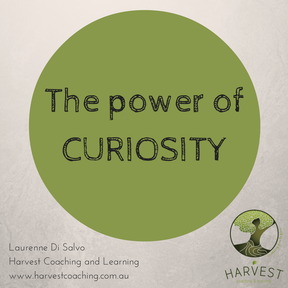 Curiosity is a wonderful thing, and not just because it piques your interest about something new, allowing you to learn and grow. Curiosity is also a key pathway to wellbeing, in large part because it fosters a mindful approach. Let me explain. Curiosity helps us suspend judgement – If we’re curious about something or someone, we tend to approach without pre-conceived ideas, therefore dropping judgement. We’re more likely to think about where the other person is coming from, or what could be influencing their perspective. We try to understand the idea, person or situation in greater depth. By default, this also brings us into the moment so that we’re approaching the situation mindfully, rather than through a lens of what we think we already know. The wonderful thing about this is that it leads to greater levels of openness, genuine interest and empathy, which builds stronger relationships, critical to our wellbeing. Curiosity helps temper our expectations – I wonder if you’ve ever approached a situation with a set of expectations around what should happen, or how things should pan out. For example, for those who have children, I wonder if you’ve had an opportunity to go out with your partner after not being out for a long time. As a result, you may have high expectations for the evening. Then, when it doesn’t quite measure up, you feel a little flat, a little disappointed. I would suggest that by approaching the evening with a mindset of curiosity, a mindset of ‘what could this night hold?’, rather than what the night should hold, you are more able to drop expectations and mindfully enjoy the moment. A curious mindset may have you asking yourself questions like, ‘what am I enjoying here?’, or ‘what am I grateful for in this situation?’ A focus on gratitude has been shown to increase levels of wellbeing and happiness. Curiosity allows for creativity – We are much more likely to approach tasks, situations and problems with creativity when we apply a curious mindset. Curiosity allows us to explore alternatives, to look at things from a different perspective, even to play with ideas and approaches. This is fantastic for our intellectual wellbeing and ongoing learning and allows for innovation, change and development. Curiosity ensures a learning mindset – When we’re curious, we can’t fail. We are likely to ask ourselves and others, ‘What can we do better?’, ‘How can I do this differently?’, ‘What’s an alternative approach?’, ‘Are there areas for improvement?’ This ensures we learn from experiences, rather than beating ourselves up about mistakes. This approach also allows for continuous improvement, as curiosity moves us out of ‘this is the way it has to be’ or ‘this is the way it’s always been’ thinking. A learning mindset is critical to our wellbeing in terms of our confidence, resilience and lifelong learning. Curiosity fosters self-compassion – In the same way that curiosity stops us judging others, it also stops us from judging ourselves, leading to greater levels of self-compassion. If we can be curious about why we feel the way we do, why we reacted as we did, what triggered us or why we found something difficult, amongst other examples, we are more likely to be gentle with ourselves and to practice self-compassion. This is important for our emotional wellbeing. Curiosity gets us into a state of flow – Often when we’re curious about something, we get completely absorbed in what we're doing to the point that we lose all sense of time. Martin Seligman, father of Positive Psychology, describes this state as ‘Flow’. This state has been shown to result in greater and more enduring levels of wellbeing and happiness. So get curious! I wonder how it will impact your wellbeing? Warmest wishes, Laurenne Di Salvo Leadership & Professional Development Coach | Corporate Trainer | Learning & Development Consultant 0413 776 564 www.harvestcoaching.com.au #curiosity #growthmindest #coaching #learning #development #strengths #flow
0 Comments
Leave a Reply. |
AuthorLaurenne Di Salvo Archives
March 2024

|
Contact+61 413 776 564
Harvest Coaching & Learning Pty Ltd operates both nationally and globally and is based in Melbourne, Australia. |
ConnectPlease leave us a Google Review
|



 RSS Feed
RSS Feed
